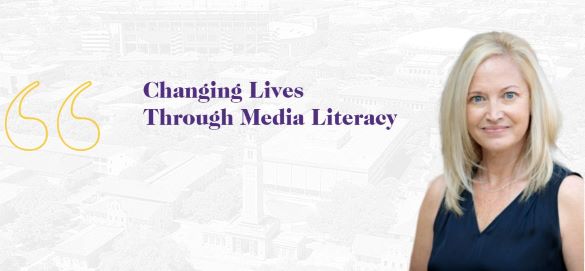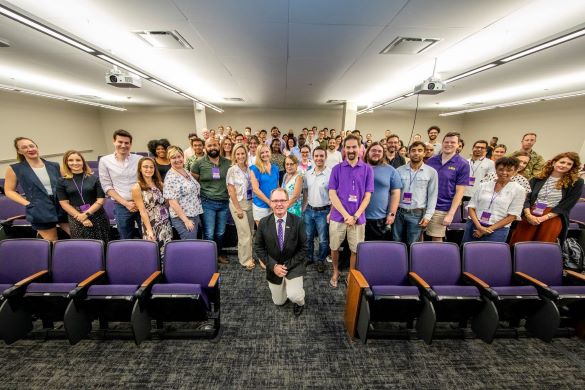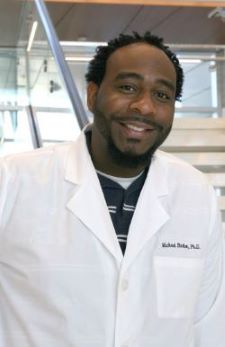A Note from the Provost
 Caption: Image of LSU's iconic Memorial Tower and the Parade Ground's stately oaks,
generated by Roy Haggerty with OpenAI's DALL-E Caption: Image of LSU's iconic Memorial Tower and the Parade Ground's stately oaks,
generated by Roy Haggerty with OpenAI's DALL-E
Dear Colleagues,
As we begin a new year, with all its excitement and promise, I thought I would take
a moment to comment on one of the big trends of 2023 – the advancement of AI – and
how I see it being put to work here at LSU. The comments that follow are condensed
from some articles that I have published on LinkedIn. I used ChatGPT to take the first
crack at condensing the LinkedIn articles, which were written without ChatGPT.
Our theme, "Scholarship First," serves as a reminder that the core mission of this
university is academic excellence. To that end, I want to engage with you in a conversation
about an increasingly prevalent technological force that, in my view, will transform
higher education: Artificial Intelligence (AI), particularly Large Language Models
(LLMs) such as ChatGPT. Literally every week there is a new announcement, including
a recent announcement (flagged by my colleague, Henry Hays) that OpenAI is launching
a commercial version of ChatGPT.
In the realm of higher education, there has been a growing curiosity, perhaps even
a fascination, around the potential of AI. However, it is essential to understand
that the scope and scale of AI's transformative capabilities will be determined not
just by technological advancements but by the rate at which we, human beings, adapt
and make use of it.
Universities like LSU that deploy LLMs and other AI first, to improve our own academic
output, will be better positioned for the future.
There are three rate-limiting factors affecting AI's adoption within our university.
First, there are ethical considerations and concerns about academic integrity. In
my conversations with many of you, I sense a palpable hesitancy about deploying AI
technologies, stemming partly from justified fears of academic dishonesty. We must
develop clear policies around AI's acceptable and unacceptable uses, especially when
it comes to intellectual property and creative outputs. In collaboration with Faculty
Senate leadership, I am going to convene working groups on instructional uses of AI,
research uses of AI, and putting AI to work to manage our day-to-day business.
A second limitation is the availability of skilled users. As I worked to understand
the nuances of LLMs over the past months, it became clear that we need to cultivate
an ecosystem of skilled AI practitioners. Training sessions and workshops can go a
long way in building this expertise. To help with this, I am co-teaching a class in which we will develop and deploy four LLMs, two for LSU use and two for private
organizations here in Baton Rouge. My co-instructors, Mr. Henry Hays and Dr. James
Ghawaly are real stars in this field. At the end of the semester, we should have 15
to 20 seniors who are well positioned to be employed by LSU or by companies in the
area, or to step out on their own to put AI to work here in South Louisiana.
A third limitation, possibly the most challenging, is around data security and data
structuring. To effectively integrate LLMs into our day-to-day operations, secure
and structured access to institutional data is essential. Developing a robust cybersecurity
framework will enable us to leverage AI securely. Structuring our data will allow
us to put LLMs to work for us on routine tasks.
To illustrate a little of AI's potential, let's take a look at some practical applications
that I have put AI to work on in recent weeks.
- Strategizing for LSU Goals: With a simple prompt, ChatGPT provided 10 strategies for improving LSU's first-year
retention rates.
- Data Compilation and Analysis: ChatGPT aided me in generating a Python script that downloaded, amalgamated and
analyzed LSU’s many policy documents, turning hours of manual work into about 30 minutes of work. I now have the ability
to query these documents on any topic I want, and can find where a matter is discussed
in a matter of a few seconds.
- Course Development: It assisted in drafting a syllabus for my 16-week course in LLMs, facilitating the
design process. I, of course, had to edit it, along with my colleagues, but it reduced
the work significantly.
- Data Analysis: Techniques like prompt engineering can be learned to make the model more effective
in tasks such as data analysis. ChatGPT 4.0 (costs $20/mth) has very powerful data
analytics tools. It can look at the structure of an uploaded Excel file, recommend
statistical analyses, run the analyses, and provide graphs of the output.
- Ethical Considerations and Best Practices: The ethical implications of using AI should not be overlooked. For routine tasks
like summarizing articles, explicit disclosure may not be necessary, just as you would
not normally feel the need to say that you used MS Word or Excel to do a piece of
work. However, for creative tasks or original outputs like manuscripts or art, disclosing
the use of AI seems more important. The New York Times ran a column on the ethics of LLMs in July, following a question from a reader who had just become
a university department chair.
If you are interested in being on one of the working groups I mentioned, please send
me a note at provost@lsu.edu and please remind me of your area of expertise.
As we work together to make LSU a leader in higher education, it is crucial that we
stay ahead of the technological innovation around us. AI offers us tools to be more
efficient, data-driven, and innovative in achieving our mission of academic excellence
and positive societal impact. At the same time, we need to ensure that we know the
problems and risks of this technology, and that we put it to use ethically.
Let’s make the 2023-2024 academic year a landmark for LSU, one where we embrace the
opportunities and challenges that come with adopting artificial intelligence in higher
education. Thank you for your work here at LSU. I look forward to working closely
with you in the year ahead.
Geaux Tigers!
Roy Haggerty
Executive Vice President & Provost
 Article: AI in Higher Education Article: AI in Higher Education
 Article: AI in Higher Education: ChatGPT use cases Article: AI in Higher Education: ChatGPT use cases
A Conversation with Dean Bissell

Kim Bissell, Dean of the Manship School of Mass Communication, shares insight into
her research and how the Manship School of Mass Communication will advance the Scholarship
First agenda. Read more about Dean Kim Bissell.
Provost's Fellow for Academic Initiatives
The Office of Academic Affairs is accepting applications for a Provost's Fellow for
academic initiatives related to undergraduate student success including the integrative
learning core, summer school, and curriculum. This is a one-year fellowship open to
all LSU faculty who have earned tenure and are either associate or full professors.
Interested faculty members should submit an updated curriculum vitae along with a
one-page letter describing interest, experience, and skills in student success and
academic leadership by Sept. 11, 2023.
Provost's Distinguished Lecture Series
Join us for the second installment of the Provost's Distinguished Lecture Series, featuring keynote speaker Dr. Michael Burton, Eugene McDermott Associate Professor
of Neuroscience from the University of Texas at Dallas. Following Dr. Burton's keynote
lecture, there will be a series of engaging presentations from LSU faculty, followed
by a reception.
Dates & Deadlines
Please visit our website for updates to important deadlines. Recent updates include:
New at LSU

The Office of Academic Affairs hosted its annual New Faculty Summit on August 15,
2023 in the newly-renovated Huey P. Long Field House. This annual event, sponsored
by Campus Federal, provides new faculty with the tools they need to be successful
during their first semester at LSU. Click here to learn more about the New Faculty Summit.
Universal Design
The LSU Online Design & Development team is offering an interactive workshop titled
"Applying Universal Design for Learning for a More Diverse, Equitable, and Inclusive
Course." This workshop covers strategies for building a diverse, equitable, and inclusive
course using the principles of Universal Design for Learning (UDL). For more information
and to register, please visit the LSU Training & Events Registration page.
|
Faculty Support
As a reminder, LSU Online & Continuing Education (OCE) provides college-dedicated
technical and course design support for faculty. The Faculty Technology Center (FTC)
and the Design & Development (D&D) team offer support one day per week for each college.
Whether faculty are just exploring the idea of teaching online or preparing to develop
and teach an online or blended course, the FTC and D&D teams are just a consult away!
For more information, visit the Faculty In-Residence Support webpage.
|
Spot Phish, Win Stuff

IT Security & Policy's (ITSP) comprehensive phishing awareness program seeks to educate
users about malicious content by running regular phishing simulations. Beginning fall
2023, at the completion of each simulated phishing campaign, ITSP will choose two
reporters to win an LSU prize bundle. One student and one employee will be chosen
at random from each month’s reporters. You must report the phish using the Reporter
button in Outlook or OWA to qualify for a chance to win. Winners will be notified
by a member of ITSP via email the week following the conclusion of each campaign.
Click here for more information on how to report a phish.
|


 Caption: Image of LSU's iconic Memorial Tower and the Parade Ground's stately oaks,
generated by Roy Haggerty with OpenAI's DALL-E
Caption: Image of LSU's iconic Memorial Tower and the Parade Ground's stately oaks,
generated by Roy Haggerty with OpenAI's DALL-E


